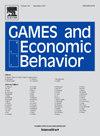动态匹配市场中排队效率的研究
IF 1
3区 经济学
Q3 ECONOMICS
引用次数: 0
摘要
研究了一个代理随机到达的双边动态匹配市场。如果另一侧的代理正在等待,则立即匹配到达的代理。否则,代理决定是退出市场还是加入队列等待匹配。等待的代价是高昂的:代理人对未来贴现,在等待的过程中产生成本。我们描述了先到先得条件下的均衡和社会最优队列大小。根据模型参数的不同,平衡队列可以比效率所要求的更短或更长。事实上,社会最优队列可能是无界的,即使均衡队列不是无界的。相比之下,当智能体只在等待时产生流量成本时,平衡队列通常比社会最优队列长(参见Baccara et al., 2020)。与单边市场不同,双边市场中均衡队列与社会最优队列的比较取决于主体的时间偏好。本文章由计算机程序翻译,如有差异,请以英文原文为准。
On the efficiency of queueing in dynamic matching markets
We study a two-sided dynamic matching market where agents arrive randomly. An arriving agent is immediately matched if agents are waiting on the other side. Otherwise, the agent decides whether to exit the market or join a queue to wait for a match. Waiting is costly: agents discount the future and incur costs while they wait. We characterize the equilibrium and socially optimal queue sizes under first-come, first-served. Depending on the model parameters, equilibrium queues can be shorter or longer than efficiency would require them to be. Indeed, socially optimal queues may be unbounded, even if equilibrium queues are not. By contrast, when agents only incur flow costs while they wait, equilibrium queues are typically longer than socially optimal ones (cf. Baccara et al., 2020). Unlike one-sided markets, the comparison between equilibrium and socially optimal queues in two-sided markets depends on agents' time preferences.
求助全文
通过发布文献求助,成功后即可免费获取论文全文。
去求助
来源期刊

Games and Economic Behavior
ECONOMICS-
CiteScore
1.90
自引率
9.10%
发文量
148
期刊介绍:
Games and Economic Behavior facilitates cross-fertilization between theories and applications of game theoretic reasoning. It consistently attracts the best quality and most creative papers in interdisciplinary studies within the social, biological, and mathematical sciences. Most readers recognize it as the leading journal in game theory. Research Areas Include: • Game theory • Economics • Political science • Biology • Computer science • Mathematics • Psychology
 求助内容:
求助内容: 应助结果提醒方式:
应助结果提醒方式:


